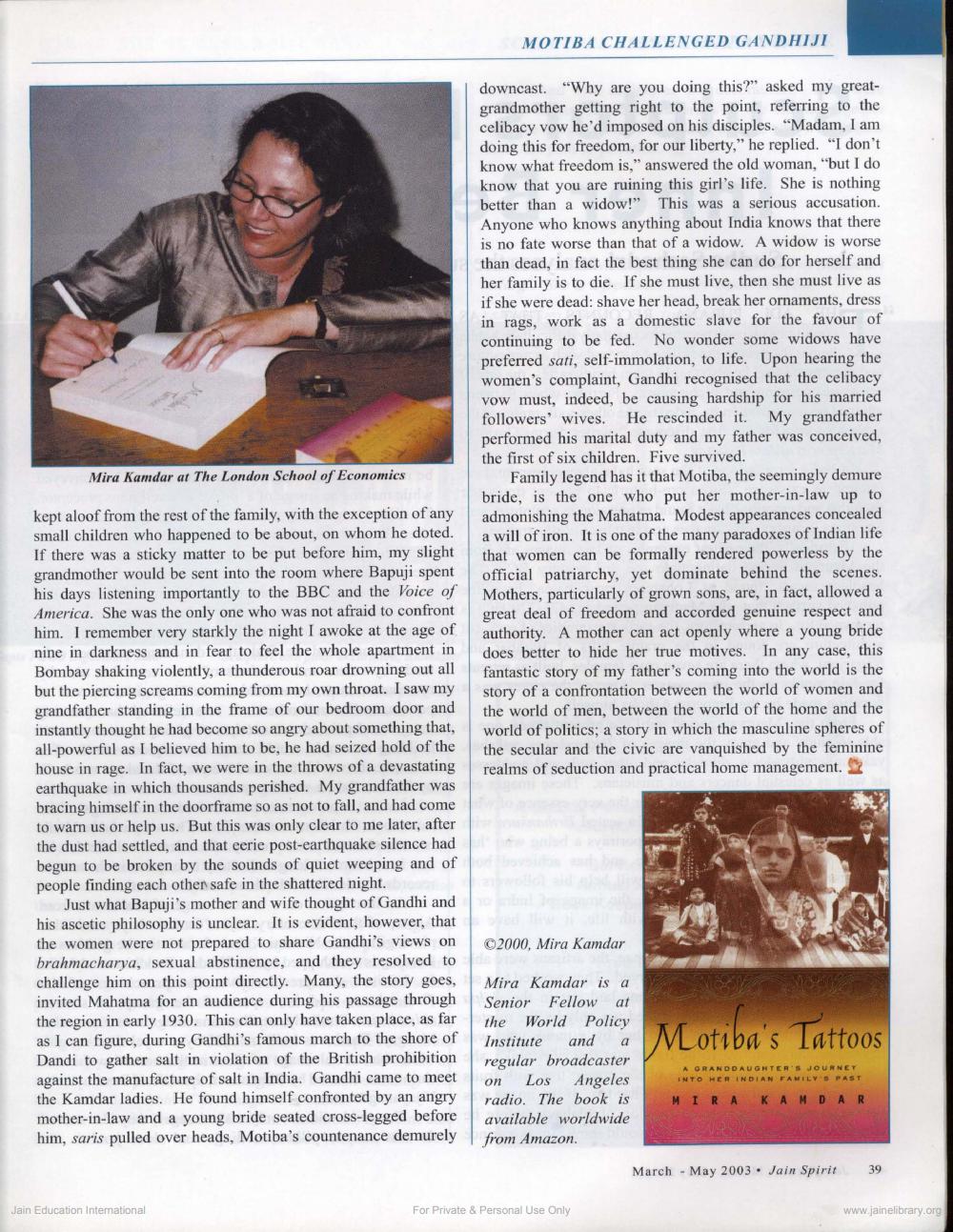Book Title: Jain Spirit 2003 03 No 14
Author(s): Jain Spirit UK
Publisher: UK Young Jains
View full book text
________________
MOTIBA CHALLENGED GANDHIJI
downcast. "Why are you doing this?" asked my greatgrandmother getting right to the point, referring to the celibacy vow he'd imposed on his disciples. “Madam, I am doing this for freedom, for our liberty," he replied. "I don't know what freedom is," answered the old woman, "but I do know that you are ruining this girl's life. She is nothing better than a widow!" This was a serious accusation. Anyone who knows anything about India knows that there is no fate worse than that of a widow. A widow is worse than dead, in fact the best thing she can do for herself and her family is to die. If she must live, then she must live as if she were dead: shave her head, break her ornaments, dress in rags, work as a domestic slave for the favour of continuing to be fed. No wonder some widows have preferred sati, self-immolation, to life. Upon hearing the women's complaint, Gandhi recognised that the celibacy vow must, indeed, be causing hardship for his married followers' wives. He rescinded it. My grandfather performed his marital duty and my father was conceived, the first of six children. Five survived.
Family legend has it that Motiba, the seemingly demure bride, is the one who put her mother-in-law up to admonishing the Mahatma. Modest appearances concealed a will of iron. It is one of the many paradoxes of Indian life that women can be formally rendered powerless by the official patriarchy, yet dominate behind the scenes. Mothers, particularly of grown sons, are, in fact, allowed a great deal of freedom and accorded genuine respect and authority. A mother can act openly where a young bride does better to hide her true motives. In any case, this fantastic story of my father's coming into the world is the story of a confrontation between the world of women and the world of men, between the world of the home and the world of politics; a story in which the masculine spheres of the secular and the civic are vanquished by the feminine realms of seduction and practical home management.
Mira Kamdar at The London School of Economics
kept aloof from the rest of the family, with the exception of any small children who happened to be about, on whom he doted. If there was a sticky matter to be put before him, my slight grandmother would be sent into the room where Bapuji spent his days listening importantly to the BBC and the Voice of America. She was the only one who was not afraid to confront him. I remember very starkly the night I awoke at the age of nine in darkness and in fear to feel the whole apartment in Bombay shaking violently, a thunderous roar drowning out all but the piercing screams coming from my own throat. I saw my grandfather standing in the frame of our bedroom door and instantly thought he had become so angry about something that, all-powerful as I believed him to be, he had seized hold of the house in rage. In fact, we were in the throws of a devastating earthquake in which thousands perished. My grandfather was bracing himself in the doorframe so as not to fall, and had come to warn us or help us. But this was only clear to me later, after the dust had settled, and that eerie post-earthquake silence had begun to be broken by the sounds of quiet weeping and of people finding each other safe in the shattered night.
Just what Bapuji's mother and wife thought of Gandhi and his ascetic philosophy is unclear. It is evident, however, that the women were not prepared to share Gandhi's views on brahmacharya, sexual abstinence, and they resolved to challenge him on this point directly. Many, the story goes, invited Mahatma for an audience during his passage through the region in early 1930. This can only have taken place, as far
only have taken place, as far as I can figure, during Gandhi's famous march to the shore of Dandi to gather salt in violation of the British prohibition against the manufacture of salt in India. Gandhi came to meet the Kamdar ladies. He found himself confronted by an angry mother-in-law and a young bride seated cross-legged before him, saris pulled over heads, Motiba's countenance demurely
© 2000, Mira Kamdar
Mira Kamdar is a Senior Fellow at the World Policy Institute and a regular broadcaster
Motiba's Tattoos
GRANDDAUGHTER'S JOURNEY TO HER INDIAN FAMILY PAST
MIRA KAMDAR
radio. The book is available worldwide from Amazon.
March - May 2003. Jain Spirit
39
Jain Education International
For Private & Personal Use Only
www.jainelibrary.org

Page Navigation
1 ... 30 31 32 33 34 35 36 37 38 39 40 41 42 43 44 45 46 47 48 49 50 51 52 53 54 55 56 57 58 59 60 61 62 63 64 65 66 67 68
